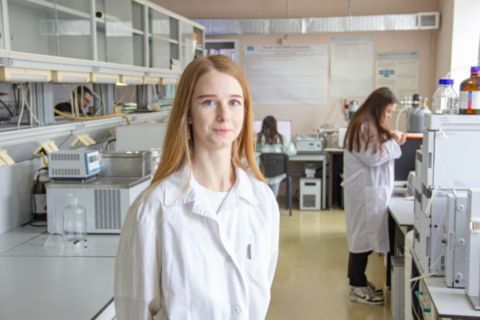A unique temperature sensor is being developed by employees of the Non-conventional Materials and Resource-Saving Technologies Research Institute of SUSU as part of the Science and Universities national project. The device measures temperature many times more accurately than its global analogues. In addition, the sensor checks itself and operates at temperatures from 0 to 800 degrees. This range is widely used in industry: nuclear energy, metallurgy. According to preliminary estimates, the accuracy of the sensor will be 1 degree. No thermocouple existing in the world can provide temperature measurements over a long period of time with such accuracy.
Scientists say that their main discovery is from the field of material science. Ferrites are used as a "filling" in the sensor. The winner of the UMNIK Competition, Master’s degree student of the SUSU Department of Materials Science, Physical and Chemical Properties of Materials Nataliia Cherkasova helps select the required composition of the calibration element. The young scientist works as an engineer in the Crystal Growth Laboratory of the Non-conventional Materials and Resource-Saving Technologies Research Institute.
– Nataliia, how did you become a participant in the UMNIK program? How was the competition itself held?
– The UMNIK program is quite well known at our university. I am engaged in research activities under the guidance of Denis Vinnik and Vladimir Zhivulin. One day we came up with an idea on how to put the results of our research into practice. But for this it was necessary to conduct many experiments to prove that the idea was workable. To do this, it was necessary to find funding, and the UMNIK project was very well suited for this. To become a participant in the program, I filled out an application on the website and made a presentation in person to the committee on the proposed project.
– What work did you submit for the competition?
– The study was titled "Development of Oxide Functional Materials for a Self-Calibrating Temperature Meter". Within the framework of UMNIK, a lot of work has been done to research and select a material that can later be used in the design of the sensor as a calibration element. Probably the main feature is that not every material is suitable for this purpose. Even within the same class, materials of different composition differ greatly in physical properties. As part of the work done, we managed to select optimal compositions of materials that can act as temperature standards, and a self-diagnostic temperature sensor can operate on their basis. We have developed and patented a technology for creating a temperature standard.
– What comments did you receive from the jury at the UMNIK competition?
– To be honest, it was such an exciting event that now I don’t even remember if there were any comments. But I can assume that since the work received support, the majority liked it.
– What does participating in this competition give you? How will it affect your future scientific activities?
– Participation in this competition provides a chance to fulfil ideas by turning them into reality and testing them for viability. The ability to implement an idea from start to finish is very important in scientific activity, and here I want to express gratitude to my supervisor, who helps at every stage of this process.
– What are your plans in science? What do you want to give to the world?
– The plans are ambitious and directly related to research activities. As a materials scientist, I can give the world new and interesting materials, for example, high-entropy single crystals of hexagonal ferrites, or explore the properties of already known materials for specific applied purposes. All this can find application in electronics and sensors, which are used everywhere in the modern world. And for the opportunity to conduct research, I would like to thank the Crystal Growth Laboratory under the leadership of Vladimir Zhivulin and the Non-conventional Materials and Resource-Saving Technologies Research Institute under the leadership of Denis Vinnik.
South Ural State University and the Innovation Promotion Foundation support young scientists who contribute to the development of science. Since 2013, undergraduate and graduate students have been participating in the UMNIK program, aimed at supporting commercially oriented scientific and engineering projects. This program allows checking how much the researchers’ development will be in demand, and also receive a grant of 500 thousand roubles for its improvement. SUSU has historically been a platform for final defences; projects are assessed by experts from the field of business and innovation.




